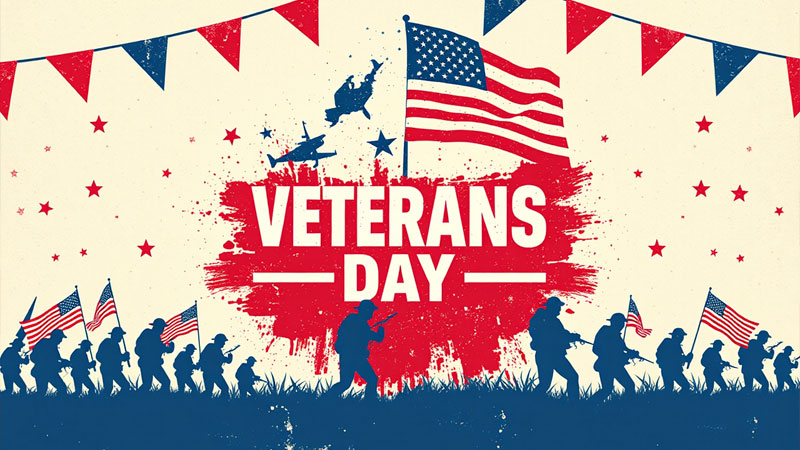Veterans Day, observed annually on November 11th, is a profound moment for the United States to honor all who have served in the U.S. Armed Forces. While formal ceremonies often involve flags and speeches, it is the music—the anthems of pride, the ballads of sacrifice, and the raw songs of reflection—that often moves the heart of the nation.
These songs don’t just fill silence; they serve as a collective expression of gratitude, a reminder of the historical significance of service, and a tribute to the deep personal cost of defending freedom.
I. The Anthems: Celebrating the American Spirit
For many, Veterans Day calls for powerful, soaring tributes that embody national pride. These songs are the backbone of parades and ceremonies, offering a unified voice of appreciation.
“God Bless the U.S.A.” (Lee Greenwood): Perhaps the most universally recognized modern patriotic song, this track has become synonymous with American pride. Its simple, heartfelt chorus—”I’m proud to be an American where at least I know I’m free”—is an undeniable tribute to the foundational freedoms veterans fight to protect.
“Ragged Old Flag” (Johnny Cash): This is a profound spoken-word piece that uses the image of a worn, old flag to tell the story of American history and resilience. It beautifully connects the sacrifices of soldiers to the symbol of the nation, reinforcing that the flag’s battered state is a testament to the battles fought for it.
“All-American Kid” (Garth Brooks): The song tells the story of a high school football hero—the titular “All-American Kid”—who leads his team to a stunning comeback victory. Instead of accepting college scholarships, he decides to join the military. The small town’s pride quickly turns to somber reflection as they wave him off to war.
The Service Songs: No Veterans Day recognition is complete without playing the official songs of each branch: “The Army Goes Rolling Along,” “Anchors Aweigh” (Navy), “The Marine’s Hymn,” “Off We Go into the Wild Blue Yonder” (Air Force), and “Semper Paratus” (Coast Guard). Playing these songs is a direct, audible salute to the men and women of each respective branch.
II. The Personal Ballads: Acknowledging the Sacrifice
While anthems celebrate the nation, other songs offer a more intimate look at the emotional weight carried by veterans and their families. These songs speak to separation, loss, and the challenge of returning home.
“American Soldier” (Toby Keith): The four-week No. 1 is a powerful statement of support for the men and women serving in the U.S. military. Unlike some of his other songs, which were more politically charged, “American Soldier” is a genuine salute to the duty, sacrifice, and quiet professionalism of the individual soldier. The lyrics emphasize that the soldier is an ordinary citizen—a father, a friend—who chooses to make an extraordinary sacrifice. Keith co-wrote the song with Chuck Cannon, which was released in November 2003.
“Letters from Home” (John Michael Montgomery): This song captures the lifeline that communication provides to a soldier stationed far away. It poignantly reminds listeners that the commitment of military service impacts entire families and that the morale of those serving is intrinsically linked to the loved ones they defend.
“I Drive Your Truck” (Lee Brice): A deeply moving song that details a man coping with the loss of a loved one in the military by using the fallen soldier’s truck. It highlights the enduring pain of loss and the way simple, everyday objects can become powerful vessels for remembrance and love.
“Arlington” (Trace Adkins): Narrated from the perspective of a soldier laid to rest in Arlington National Cemetery, this song is a powerful meditation on final sacrifice, ensuring that the veteran’s story—and the choice he made to serve—is never forgotten.
“Something To Believe In” (Poison): The 1990 ballad is essentially a heartfelt cry for meaning, hope, and genuine faith in a world full of pain, hypocrisy, and disillusionment. The second verse tells a profoundly sad story of a Vietnam veteran who returns home to find himself abandoned and struggling. The verse focuses on societal abandonment, the trauma of war, and broken promises, posing the question: If a country can betray its own heroes, what is there left to believe in?
“Travelin’ Soldier” (The Dixie Chicks/Cody Johnson): The song tells a heartbreaking story of a teenage girl and a young soldier, “two days past eighteen,” who meet in a cafe before he leaves to fight in the Vietnam War. They begin a correspondence, and the girl waits for him, only to hear his name read on a list of local soldiers killed in action during a high school football game. The Dixie Chicks took the song to No. 1 in 2003 with Johnson, an avid supporter of American values, recently released a more uptempo version of the song due to fan demand.
“If You’re Reading This” (Tim McGraw): The song is a poignant tribute to the families of fallen soldiers and is written from the perspective of a soldier’s final letter home. The lyrics take the form of a pre-written letter intended to be delivered to his family only if the soldier is killed in action. The chorus delivers the heartbreaking, yet comforting, final message. McGraw debuted the song at the 2007 ACM Awards, where he was joined by 100 relatives of fallen soldiers, which led to a standing ovation.
III. The Songs of Reflection: Honoring the Whole Story
Some of the most essential songs for Veterans Day are those that encourage deep reflection on the cost and complexity of war, especially for those who returned home scarred, physically or emotionally.
“Born in the U.S.A.” (Bruce Springsteen): Often mistaken for a simple burst of patriotism, this iconic song is actually a sobering protest song. It tells the story of a Vietnam veteran struggling to find work and respect after his service, highlighting the need to support veterans long after the fighting ends.
“8th of November” (Big & Rich): Based on the true story of the 173rd Airborne Brigade’s fateful clash in Vietnam, the song honors the bravery of those involved and emphasizes the bond between “brothers in arms,” a theme frequently echoed by veterans of all eras.
“Goodnight Saigon” (Billy Joel): Joel’s song follows a group of Marines from their training to the jungles of Vietnam, providing a vivid and emotional snapshot of the war experience and the lifelong trauma carried by those who survived.
Ultimately, the best Veterans Day songs, regardless of genre, share a common purpose: they give voice to an experience that is often too complex for words alone. They ensure that the heroism, sacrifice, and continued struggles of our veterans are not just commemorated but truly understood.
As you observe Veterans Day, let these songs serve as your personal soundtrack of appreciation, allowing the music to speak the gratitude that words sometimes fail to capture.





